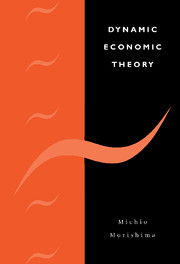Book contents
- Frontmatter
- Contents
- Preface
- 1 The method of dynamic analysis
- 2 Households' and firms' economic behaviour
- 3 Stability conditions for a temporary equilibrium: the linear case
- 4 Stability conditions for a temporary equilibrium: the non-linear case
- 5 Comparative dynamics
- Appendices
- Mathematical notes
- ADDENDUM
- Introduction
- Article I Walras' own theory of tatonnement [partly written in 1958]
- Article II Tatonnement in quantities: truncation, equilibration, growth [1956]
- Article III A contribution to the non-linear theory of the trade cycle [1958]
- Article IV Stability, oscillations and chaos
- Article V A generalization of the gross substitute system [1970]
- Article VI The laws of the working of the quasi-Frobenian system [1954, yet unpublished]
- Article VII The Cournot–Walras arbitrage, resource consuming exchange, and competitive equilibrium (with M. Majumdar) [1978]
- Article VIII The dilemma of durable goods
- References
- Index
Introduction
Published online by Cambridge University Press: 08 February 2010
- Frontmatter
- Contents
- Preface
- 1 The method of dynamic analysis
- 2 Households' and firms' economic behaviour
- 3 Stability conditions for a temporary equilibrium: the linear case
- 4 Stability conditions for a temporary equilibrium: the non-linear case
- 5 Comparative dynamics
- Appendices
- Mathematical notes
- ADDENDUM
- Introduction
- Article I Walras' own theory of tatonnement [partly written in 1958]
- Article II Tatonnement in quantities: truncation, equilibration, growth [1956]
- Article III A contribution to the non-linear theory of the trade cycle [1958]
- Article IV Stability, oscillations and chaos
- Article V A generalization of the gross substitute system [1970]
- Article VI The laws of the working of the quasi-Frobenian system [1954, yet unpublished]
- Article VII The Cournot–Walras arbitrage, resource consuming exchange, and competitive equilibrium (with M. Majumdar) [1978]
- Article VIII The dilemma of durable goods
- References
- Index
Summary
After DKR was published in Japanese in 1950, a great theoretical development has been made in the three main areas of the general equilibrium theory, concerning existence, uniqueness and stability of general equilibrium. The existence theorem is an achievement of efforts in the first half of the 1950s, while its second half and the first half of the 1960s were devoted to uniqueness and stability, mainly to the latter. In this addendum I sketch the theoretical development after DKR in my own way and show how I see it from my present arrival point.
The existence problem has been solved by formulating Walras' economy in terms of inequalities, rather than equations. This inequality approach is not entirely foreign to Walras, who supports the scarcity theory of value asserting that the price is zero for a ‘free (or non-scarce) good’, that is a commodity for which supply exceeds demand in equilibrium. Walras is concerned with an economy in which an exchange is actually made, though some goods may be free, and distinguishes this general equilibrium (which may be called an essential equilibrium) from the more general one in which goods may all be free and, therefore, not traded.
Information
- Type
- Chapter
- Information
- Dynamic Economic Theory , pp. 188 - 195Publisher: Cambridge University PressPrint publication year: 1996
